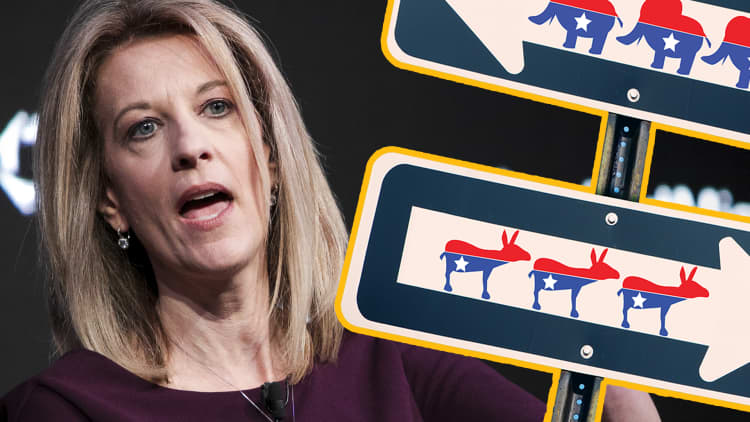Sen. Elizabeth Warren unveiled a plan Friday to break up massive technology companies such as Amazon and Facebook, the clearest proposal yet in the 2020 presidential race to limit the growth of Silicon Valley.
In a blog post, the Democratic presidential hopeful from Massachusetts wrote that she wants to make "big, structural changes to the tech sector to promote more competition." Those overhauls would include "breaking up" Amazon, Facebook and Google — companies that have come under scrutiny for user data security and consolidation of services such as e-commerce and digital advertising.
"Today's big tech companies have too much power — too much power over our economy, our society, and our democracy," Warren wrote. "They've bulldozed competition, used our private information for profit, and tilted the playing field against everyone else. And in the process, they have hurt small businesses and stifled innovation."

Though Warren's post did not mention Apple, her campaign said the plan would affect the tech behemoth. The company could have to choose between running its App Store or building its own apps, Warren spokeswoman Saloni Sharma said.
Warren's proposal comes as pockets of the 2020 Democratic primary field have called for more drastic action to protect consumers and workers from what they call Silicon Valley abuses. Sen. Amy Klobuchar, D-Minn., has floated legislation to protect consumer data amid concerns about what user information Facebook shares with third-party companies.
Sen. Bernie Sanders, a Vermont independent running for president as a Democrat, has repeatedly targeted Amazon by urging it to boost wages and benefits for workers.
Warren says her plan would have two planks. The senator writes that she would push to pass legislation to designate certain companies "platform utilities." She defines those as "companies with an annual global revenue of $25 billion or more" that "offer to the public an online marketplace, an exchange, or a platform for connecting third parties."
Warren writes:
These companies would be prohibited from owning both the platform utility and any participants on that platform. Platform utilities would be required to meet a standard of fair, reasonable, and nondiscriminatory dealing with users. Platform utilities would not be allowed to transfer or share data with third parties.
Various parties would have the right to sue over the violation of those rules. A company in violation would have to pay a fine worth 5 percent of annual revenue.
Under this standard, Amazon Marketplace — where third-party vendors sell products — would split from AmazonBasics, the company's in-house brand, Warren wrote. Google would have to spin off its search business, among other services.
The senator also said she would appoint regulators to undo what she called "anti-competitive mergers," such as Amazon's purchase of Whole Foods, Facebook's acquisition of WhatsApp and Instagram and Google's purchase of Waze.
"Here's what will change: Small businesses would have a fair shot to sell their products on Amazon without the fear of Amazon pushing them out of business," Warren wrote. "Google couldn't smother competitors by demoting their products on Google Search. Facebook would face real pressure from Instagram and WhatsApp to improve the user experience and protect our privacy. Tech entrepreneurs would have a fighting chance to compete against the tech giants."
Facebook and Amazon declined to comment on Warren's plan. Apple and Google did not immediately respond to CNBC's requests to comment.
All of the companies Warren targeted have fought characterizations of having too much of a hold on their industries for years. For instance, Apple has various competitors in the smartphone and computer markets. Amazon also faces numerous rivals not only online but also in the form of physical retailers.
The big tech companies have faced increasing scrutiny in recent months over allegations of improper monopoly behavior.
Google has been tangling with regulators in Europe for years, and in July was slapped with a record $5 billion fine by the European Commission, which found that the company violated the European Union's antitrust rules. Amazon and Facebook have also faced scrutiny from American lawmakers and academics over alleged monopoly behavior, though the companies have vehemently rejected such designations.
In the U.S., Apple is embroiled in a legal fight at the Supreme Court over its App Store marketplace that experts say could lead to hundreds of millions of dollars in fines and force a reworking of its app platform. If the company loses, the iPhone owners who brought the case will be permitted to move forward with an antitrust suit against the company for allegedly inflating prices.
Apple has said it cannot be sued over the matter. A decision is expected by late June.
WATCH: What Democrats' plans could mean for growth, spending and inequality




